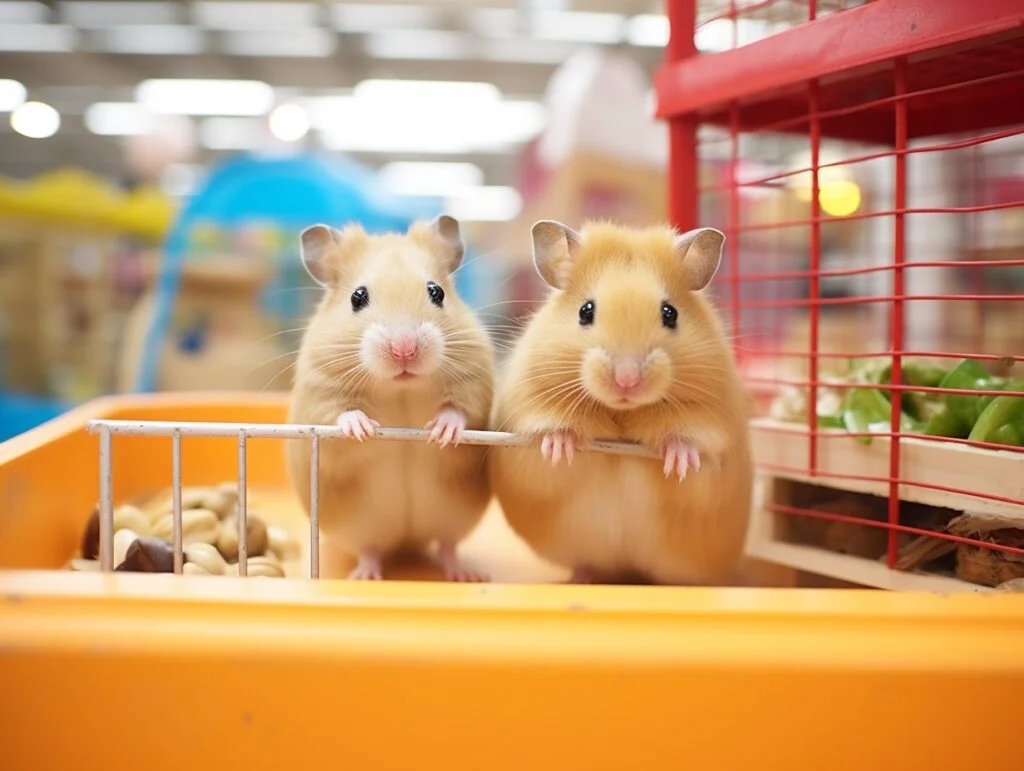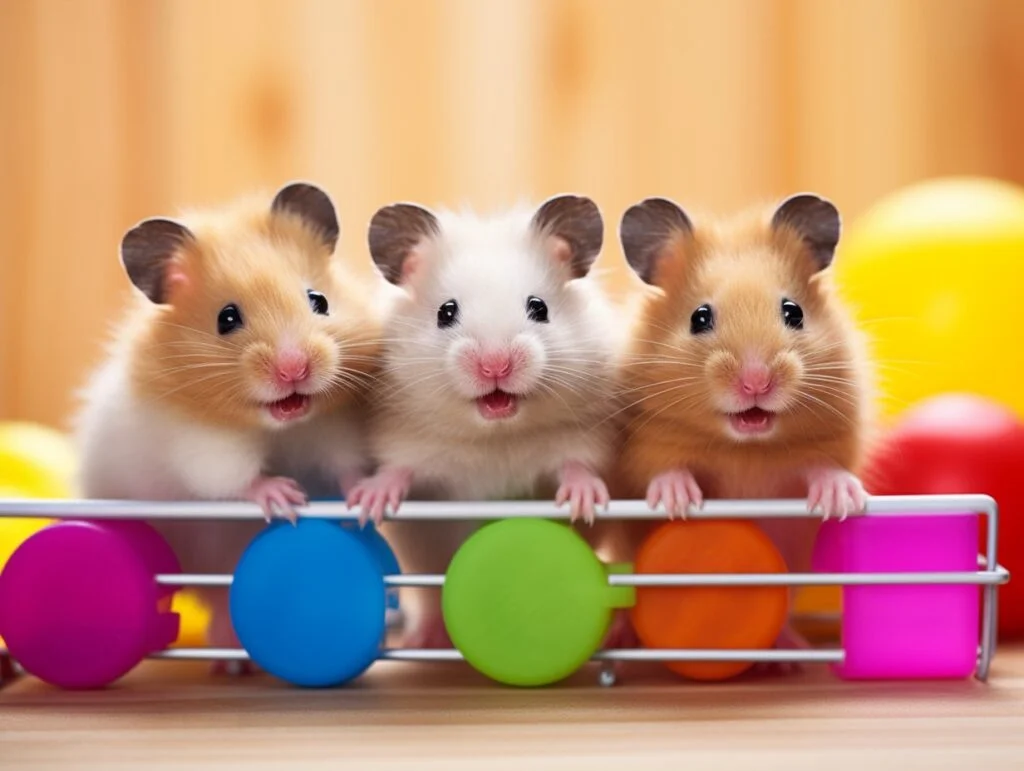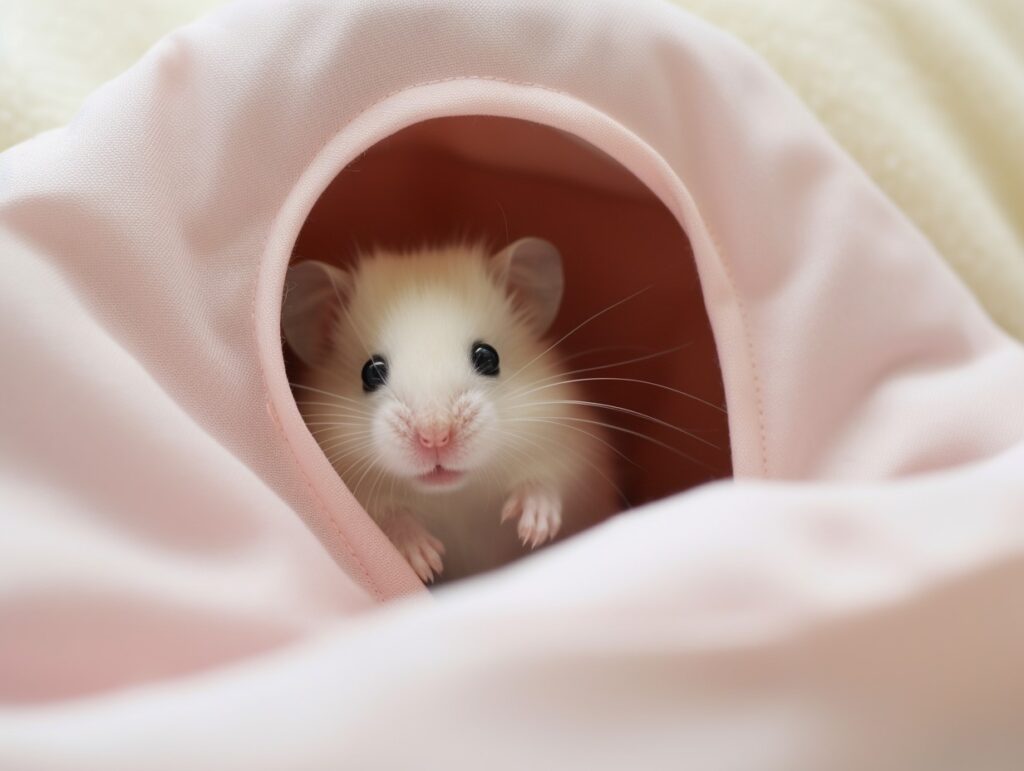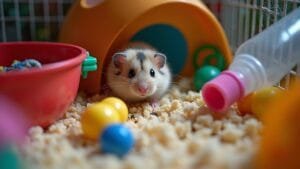Exploring the Question: Why Do Hamsters Eat Each Other?
When it comes to our beloved pet hamsters, there’s a fascinating yet rarely discussed aspect of their behavior: cannibalism. You might be surprised to learn that under certain circumstances, hamsters may exhibit this unsettling behavior. In this comprehensive guide, we’ll delve into the intriguing world of hamster cannibalism, exploring the reasons behind it, the triggers, and most importantly, how to prevent it. If you’ve ever wondered, “Do hamsters eat each other?” – you’re in the right place to decode this mystery and ensure the well-being of your furry friends.
Understanding Cannibalism in Hamsters

It’s important to understand that cannibalism among hamsters is not a ‘normal’ behavior in the sense that it’s not part of their everyday activities. It’s not like they wake up and think, “Hmm, I fancy a bit of my cage-mate today.” It’s a behavior that’s often triggered by specific circumstances or stresses.
Debunking the Myths
Myth 1: Hamsters are naturally cannibalistic
Fact: As discussed earlier, hamsters don’t naturally resort to cannibalism. It’s a behavior driven by extreme stress or threat.
Myth 2: All hamster species are likely to resort to cannibalism
Fact: Not all hamster species have the same propensity for this behavior. Syrian hamsters, for instance, are known to be highly territorial and can resort to cannibalism if forced to share their space.
Myth 3: Hamster mothers eat their young routinely
Fact: While it’s true this can happen, it’s not a normal occurrence. Hamster mothers may consume their young if they feel threatened or if the babies are sick or weak.
Maternal Instincts and Survival
Now, this might sound a bit harsh, but sometimes, Mother Nature can be pretty brutal. For instance, a mother hamster might eat her young if she senses danger or feels threatened. This is a survival instinct, designed to protect the rest of the litter and herself from potential predators. It’s crucial to remember that this doesn’t mean your pet hamster is cruel or evil – these are instinctual behaviors honed by thousands of years of evolution.
Protecting the Litter: Maternal Survival Instincts
For a mother hamster, the safety and survival of her litter are paramount. When she senses danger or perceives a threat to her nest, her instincts kick in to safeguard the continuation of her species. This is a survival mechanism that has evolved over thousands of years, and it’s hardwired into her DNA.
Data on Maternal Cannibalism
Research into hamster behavior has provided valuable insights into the frequency and triggers of maternal cannibalism:
- Frequency: Studies have shown that maternal cannibalism is not uncommon in hamster populations, occurring in various species.
- Environmental Stressors: High levels of environmental stress, such as disturbances to the nest or the presence of unfamiliar scents, can trigger maternal cannibalism.
- Cannibalism as a Response: The mother hamster may perceive her actions as a means of reducing the risk of predation. By eliminating a perceived threat (her offspring), she aims to protect the remaining young.
Stress: A Trigger for Cannibalism
Hamsters are creatures of habit, and they don’t like change. They can feel the dramatic change in their environment and become anxious, which can potentially lead to such drastic actions. Under stressful conditions, hamsters can resort to cannibalism.

| Stress Factors | Effects on Hamsters |
|---|---|
| Inappropriate Handling | – Rough or excessive handling, especially of pregnant or nursing females, can lead to hamster stress. |
| Improper Diet | – A diet lacking essential nutrients can induce stress and potentially aggressive behavior in hamsters. |
| Changes in Environment | – Sudden environmental changes, such as shifts in temperature, light, or noise levels, can cause stress in hamsters. |
Recognizing Signs of Stress in Hamsters :
Stress can take a toll on your furry friend, and as a responsible hamster owner, it’s crucial to be vigilant and observant. Understanding the signs of stress is the first step in addressing and mitigating its effects. Here are some key indicators to help you recognize when your hamster might be experiencing stress:
- Excessive grooming or hair loss: Hamsters are known for their meticulous grooming habits, but when this behavior becomes excessive, it could be a red flag. Over-grooming may indicate that your hamster is stressed. Signs to watch out for include patches of fur missing or an unusually thinning coat.
- Changes in behavior: Hamsters are usually active and curious creatures, so any sudden shift towards lethargy or unusual behaviors should be noted. If your hamster becomes less active, spends more time hiding, or exhibits unusual behaviors such as excessive burrowing or digging, it might be a sign of stress.
- Altered eating habits: Stress can also affect your hamster’s appetite. Keep an eye on their food consumption. If they are eating significantly less than usual or refusing to eat altogether, it could be due to stress. On the other hand, stress might lead to overeating in some cases.
- Increased aggression: While some hamsters may become more withdrawn when stressed, others might become more aggressive. Watch for signs of aggression, such as biting or lunging, especially during interactions.
- Physical symptoms: Stress can manifest in physical symptoms as well. Look for signs like wet tail (a condition associated with stress and diarrhea), drooping ears, or an unkempt appearance.
Prevention Strategies to Avoid Cannibalism in Hamsters
It can be shocking and heartbreaking to witness cannibalistic behaviors among your furry friends. But don’t worry, there are steps you can take to prevent this from happening. It involves understanding hamster psychology, providing appropriate care, and monitoring your pets closely.
Proper Nutrition
Offer them a variety of fresh fruits, vegetables, and high-quality hamster mix from a reputable pet store. Regularly check to ensure that they are eating properly.
Stress-Free Environment
Hamsters are sensitive to stress, which can trigger aggression and cannibalistic tendencies. As such, maintaining a calm and quiet environment is essential. Avoid sudden changes in their habitat, and minimize exposure to loud noises and disturbances.
Regular Health Checks
Health issues can sometimes be a reason for cannibalism in hamsters. Regularly check your hamsters for signs of illness and seek veterinary care as needed. The healthier your hamsters are, the less likely they are to engage in cannibalistic behavior.
Sexual Maturity and Breeding
Sexual maturity can also lead to aggression and cannibalistic behavior in hamsters. If you have a mixed-sex group, consider separating them once they reach sexual maturity to avoid competition and conflict.
The Impact of Overcrowding and Inbreeding
The living conditions of your hamsters play a critical role in determining their behavior, and understanding the implications of overcrowding and inbreeding is essential for responsible hamster ownership. In this section, we’ll delve deeper into these factors and their potential consequences.

Overcrowding
Hamsters, by nature, are solitary animals, and their well-being depends on having adequate space for various activities like exploring, playing, and resting. Overcrowding within a hamster habitat can lead to a range of negative behaviors, including aggression and, in extreme cases, cannibalism. When hamsters are forced to share limited space, they may engage in fierce competition for essential resources such as food, water, and sleeping areas.
To ensure a harmonious living environment for your hamsters, it’s crucial to provide them with ample space. As a rule of thumb, each hamster should have at least 360 square inches of floor space in their cage. This not only reduces stress but also minimizes the chances of territorial disputes that can escalate into violence and cannibalistic behaviors.
Inbreeding
Inbreeding occurs when closely related hamsters are allowed to mate, and it can have severe consequences on both behavior and health. Inbred hamsters are more likely to exhibit abnormal behaviors, such as increased aggression and territorialism. Additionally, they are at a higher risk of developing various health problems.
One critical aspect to consider is the weakened immune system in offspring resulting from inbreeding. Hamster pups born from closely related parents may have compromised immune systems, making them susceptible to illnesses and infections. In some cases, when a mother hamster senses that her offspring are sick or weak due to these health issues, she may resort to eating them. It’s essential to understand that this act is driven by maternal instincts to remove perceived threats from the group.
To prevent the negative consequences of inbreeding, it’s advisable to avoid mating hamsters that are closely related. Keep a record of the lineage of your hamsters to ensure responsible breeding practices and maintain the health and well-being of your pets.
By addressing overcrowding and avoiding inbreeding, you can create a safer and more comfortable environment for your hamsters, reducing the risk of cannibalistic behaviors and promoting their overall welfare
How to Prevent Overcrowding and Inbreeding
Prevention is always the best strategy, and in this case, it’s pretty straightforward. The following are some preventative measures you can take:
- Provide Adequate Space: Ensure each hamster has enough space. As a rule of thumb, each hamster should have at least 360 square inches of floor space in their cage.
- Separate Males and Females: This prevents unplanned breeding and overcrowding. Also, hamsters may become aggressive towards each other during the breeding season, so it’s best to keep them apart.
Wrapping Up
It’s important to keep in mind that hamsters, like all animals, have their own sets of behaviors and instincts that may be difficult for us humans to understand. If you’re ever concerned about your hamster’s behavior, the best course of action is always to consult with a vet or a hamster-keeping expert. They can provide insight into what might be going on and offer suitable solutions.
So, to answer the question, “Is it normal for hamsters to eat each other?” – the answer is no, it’s not ‘normal,’ but it’s a behavior that can occur under extreme circumstances. Remember, understanding and respecting your hamster’s natural behavior and needs are the keys to ensuring its well-being.
FAQ: Hamster Cannibalism
Q: Why do some hamsters eat each other?
Hamsters may eat each other, especially the babies, under certain circumstances. This behavior is often triggered by stress, environmental changes, or perceived threats to their nest.
Q: Is it normal for hamsters to eat each other?
No, it’s not a normal behavior for hamsters. It occurs under extreme conditions, such as when a mother hamster feels her babies are in danger or if they are sick or weak.
Q: What causes maternal cannibalism in hamsters?
Maternal cannibalism is often a response to environmental stressors, like disturbances to the nest or unfamiliar scents. Mothers may eat their young to reduce the risk of predation.
Q: How can I prevent hamsters from eating each other?
To prevent cannibalism, provide a stress-free environment with proper care. Avoid overcrowding, ensure hamsters have enough space, separate males and females, and monitor their health.
Q: Should I be concerned if I see hamsters exhibiting cannibalistic behavior?
While it’s not common, it’s essential to address the issue. If you’re concerned, consult with a vet or a hamster expert for guidance on how to handle the situation and ensure your hamsters’ well-being.
Q: Can hamsters become cannibals due to overcrowding alone?
While overcrowding can contribute to stress among hamsters, cannibalism is usually a result of extreme stress or perceived threats. Overcrowding alone may lead to aggressive behavior but not necessarily cannibalism.
Q: How can I create a stress-free environment for my hamsters?
To reduce stress, maintain a consistent and quiet environment for your hamsters. Avoid sudden changes in temperature, light, or noise levels, and provide ample space and resources to prevent competition.
Q: Are there specific signs of illness I should watch for in my hamsters?
Yes, watch for signs like weight loss, lethargy, changes in appetite, and unusual behavior. Any concerning signs should prompt a visit to a veterinarian.
Q: What should I do if I suspect my hamster is stressed or exhibiting cannibalistic behavior?
If you notice signs of stress or cannibalism, consult a veterinarian or a hamster expert for guidance. They can provide specific advice based on your hamster’s situation.
Q: Can hamsters become territorial even when not overcrowded?
Yes, some hamster species, like Syrian hamsters, can be highly territorial even in spacious enclosures. It’s important to monitor their behavior and be cautious when introducing them to other hamsters.




